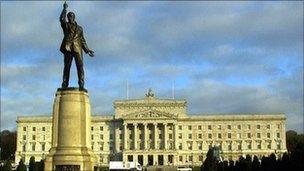Executive agrees key priorities for government
- Published

The Northern Ireland Executive has finalised its programme for government
The executive has committed itself to creating more than 25,000 jobs over the next four years.
The figure is contained in the programme for government which MLAs have been debating.
It was printed through the night after a late night executive sitting.
It promises to raise £300m through foreign direct investment; aid small and medium sized businesses through a £50m loan fund; and cut the number of local councils to 11 by 2015.
In all there are more than 70 commitments, many of which are not new.
The executive ministers also committed themselves to increasing visitor numbers to 3.6m by 2013 and to supporting 200 projects through a Creative Industries Innovations Fund.
They also pledge to provide one year's free pre-school education for all children in Northern Ireland and to double glaze all housing executive homes.
Despite opposition from SDLP minister Alex Attwood and Ulster Unionist minister Danny Kennedy, the executive has decided that 11 rather than 15 new councils will replace the existing 26.
It is believed there will be an election in 2014, but the councils will not become fully operational until the following year.
The first and deputy first ministers have made statements on the programme for government and investment strategy at a special assembly sitting on Thursday.
Mr Robinson said: "It is a statement that we in Northern Ireland are prepared to take responsibility for our future, it is a statement that we are prepared to modernise and reform, and most importantly it is a statement that Northern Ireland is moving forward as one community.
"Through this programme for government we will seek to rebuild and rebalance our economy and we will seek to address the legacy of division that lingers from the past."
However, he added: "It is the delivery on the ground, not the words in the document, on which we will all ultimately be judged."
Mr McGuinness said a number of sites associated with the Troubles would be put to new use, including developing the Maze prison site, regenerating Londonderry's former military sites of Fort George and Ebrington and progressing the plan to see schools from different sectors share the Lisanelly military site in Omagh.
"The good news is that all of these projects and initiatives which promote sharing of space are working in the same direction as the tide of history," he said.
"They reflect a new dispensation at a political level."
Ulster Unionist leader Tom Elliot said he was glad the programme had finally been published.
"It would be quite easy to begrudge it, but why should we do that now? I have called for it for eight months so I am pleased and I welcome its publication," he said.
SDLP leader Alasdair McDonnell said the programme had not gone far enough in its commitments to tackle poverty, or to capitalise on cross-border initiatives.
"I'm not sure if I went down the Newtownards Road, or down the Falls Road or on the Shankill Road today, and told them we were going to provide them with a 'poverty outcomes model' that they would be impressed with this programme for government," he said.
Enterprise Minister Arlene Foster also made a statement on the economic strategy.
She said it was an "important day for the executive and the assembly".
"The effect of the recent and deep recession will be felt for some time, but I believe we can make the necessary changes and this strategy sets out what the executive plans to do over the short, medium and longer term," she said.
"We will shortly publish a completion action plan and I can assure members that performance will be regularly updated against our proposed performance action plan."
'Not such a huge gift'
BBC NI Education Correspondent Maggie Taggart said the pledge to provide one year's free pre-school education for young children was "not such a huge gift as it may appear because, already, the vast majority of parents who apply for a place get one".
"The Department of Education says that of the 21,000 parents who applied in 2010, more than 90% got a place," she said.
"However, the figures can mask the true picture because some did not apply and recently there have been complaints that children were offered places miles away from their homes.
"The minister says it would be impossible to guarantee parents their first choice of location."
In a separate development on Thursday, the education minister, John O'Dowd, said he had found an extra £40m for schools to spend over the next three years.
Mr O'Dowd said the money had come from a contingency fund within his budget, which he had now decided to allocate to schools.
The department of education has admitted that, despite the extra money, within three years the education budget will have been reduced by about £150m in real terms, compared to this year.
The executive delivered its budget in the spring, but the programme for government that sets out its priorities has taken longer.
The investment strategy is being adjusted following the Irish government's decision to postpone the £400m which it had promised to build the A5 dual carriageway.
On Wednesday afternoon, the first and deputy first ministers welcomed an agreement that the legislation to provide for an Education and Skills Authority should be in place by July next year.
The new single education authority is an organisation-in-waiting and will replace the existing education and library boards across Northern Ireland.
Education Minister John O'Dowd has told the Association of Education & Library Boards the Education Skills Authority will officially take up its role in April 2013.
He said all necessary legislation will be in place by July next year.
- Published13 November 2011
- Published3 October 2011
- Published22 September 2011
- Published5 April 2011